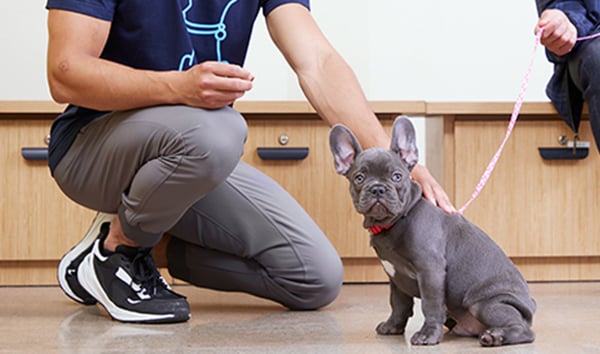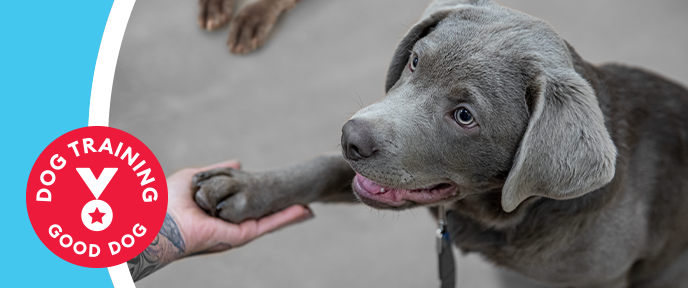10 Essential Commands Every Pup Learns Faster with Dog Training Near Me
Essential Idea for Mastering Canine Training at Home
Grasping pet dog training at home requires a tactical approach. Persistence, uniformity, and positivity are vital elements. Developing a regular assists develop a sense of protection for the dog. Using favorable reinforcement constructs depend on and interaction. Lots of proprietors have a hard time with keeping rate of interest and engagement throughout training sessions. Comprehending exactly how to navigate these obstacles can lead to a lot more effective training outcomes. What techniques might be most helpful in getting rid of these common barriers?
Develop a Regular Routine
When training a pet dog, establishing a constant routine is necessary for fostering etiquette and a solid bond between the proprietor and family pet. A structured routine supplies pets with a complacency, assisting them understand what to anticipate every day. Routine feeding times, exercise, and training sessions produce a foreseeable environment, which can lower stress and anxiety and promote a sense of stability.
Proprietors must intend to include daily activities at the exact same time to reinforce this regimen. Early morning walks, playtime, and training exercises need to take place consistently. Furthermore, including commands and hints during these activities can better improve learning.
Usage Favorable Support
A consistent regular prepares for effective training, however the methods utilized during training sessions considerably affect a dog's discovering experience. Favorable support arises as an effective tool in shaping wanted habits. This approach entails rewarding a pet for showing particular actions, properly encouraging them to repeat those habits (Dog Training Near Me). Benefits can consist of deals with, praise, or play, creating a positive organization with the activity done
Making use of positive reinforcement fosters a bond of trust fund between the pet dog and fitness instructor, boosting interaction and understanding. It is critical to supply incentives immediately after the desired actions to reinforce the link. Consistency in using this method assures the pet dog can plainly link the habits with the benefit. Avoiding penalty or adverse support can lead to a more passionate and certain learner. By concentrating on positive support, trainers can develop a helpful environment where dogs grow and learn efficiently.
Keep Training Sessions Short and Fun
Efficient pet training needs keeping sessions short and engaging to keep the canine's interest and enthusiasm. Commonly, sessions must last no longer than 10 to 15 mins, as pet dogs have limited interest periods. By concentrating on short intervals, instructors can avoid disappointment for both the pet dog and the trainer, enhancing the learning experience.
Incorporating play and positive communications right into training can make sessions pleasurable. Using playthings, treats, or praise as rewards not only encourages the pet but additionally enhances the bond in between the animal and instructor. Altering activities frequently can also help keep the pet dog's rate of interest alive, as different tasks stimulate mental interaction.
Additionally, finishing each session on a positive note, such as commemorating a tiny success, ensures the dog associates training with fun. Eventually, keeping training sessions short and pleasurable advertises efficient knowing and enhances the general training process.
Set Realistic Goals
Setting reasonable goals is vital for successful canine training. Fitness instructors should begin by evaluating their pet dog's current skills and behavior tendencies, enabling them to develop possible objectives. For instance, instead of going for intricate commands, starting with fundamental signs like "rest" or "remain" can cultivate a feeling of achievement.
In addition, damaging down larger goals right into smaller sized, manageable steps aids maintain inspiration for both the fitness instructor and the canine. This approach also permits modifications along the means, ensuring that challenges do not come to be frustrating.
It is important to identify that each pet dog learns at its own rate; patience is key. Keeping assumptions grounded aids prevent irritation and encourages regular progress. Dog Training Near Me. In conclusion, establishing reasonable goals not just enhances the training experience yet additionally strengthens the bond in between the pet dog and the fitness instructor, resulting in a more harmonious and effective training journey
Mingle Your Pet
Achieving realistic training goals prepares for an all-round pet, but socializing plays a considerable role in a dog's growth. Socializing a pet involves subjecting it to numerous atmospheres, people, and other animals, which assists to construct self-confidence and reduce stress and anxiety. Early socialization, ideally in between 3 and fourteen weeks of age, is crucial for forming a dog's actions and character. This direct exposure enables pets to learn proper communications and develop vital social abilities.
Proprietors should introduce their pet dogs to different circumstances gradually, guaranteeing each experience is favorable and gratifying. Seeing parks, going to puppy courses, or arranging playdates with various other pet dogs can promote these communications. Additionally, observing other dogs and learning from their behaviors can better boost a pet dog's social skills. Inevitably, regular and positive socialization promotes a well-adjusted pet dog that conveniently navigates different social setups throughout its life.
Hold Your Horses and Relentless

In addition, perseverance is crucial. Normal method enhances website link habits and commands, guaranteeing that the pet preserves what has actually been learned. It is essential to commemorate tiny success, as they urge both the proprietor and the dog to maintain proceeding. Recognizing obstacles as component of the trip instead of failures can aid keep inspiration. Inevitably, an individual and consistent method not just builds a stronger bond in between pet dog and proprietor yet likewise lays the foundation for reliable training and long-term obedience.

Include Educating Into Every Day Life
Incorporating training right into day-to-day live can improve a canine's knowing experience. Regular activities, such as walking or feeding, existing important chances for positive reinforcement. By flawlessly mixing training with everyday activities, proprietors can grow much better behavior in their pet dogs over time.
Daily Routine Assimilation
Exactly how can pet dog owners effortlessly blend training right into their day-to-day routines? By integrating training sessions right into day-to-day tasks, proprietors can enhance their pet's learning experience. For instance, basic commands can be exercised throughout strolls, such as "rest" prior to crossing streets or "heel" while navigating with parks. Feeding time provides an additional chance; owners can include commands like "wait" or "leave it" before offering the food bowl. Furthermore, playtime can offer as a training ground for commands like "bring" or "drop it." Uniformity is key; by embedding training right into routine tasks, canines discover that commands are appropriate in different contexts. This approach not just enhances learning but also enhances the bond between the canine and its owner.
Favorable Reinforcement Opportunities
Educating possibilities abound throughout a pet's day-to-day live, particularly when combined with positive reinforcement strategies. Everyday tasks provide minutes for training, such as throughout strolls, feeding times, or play sessions. Compensating a canine for resting prior to getting food improves obedience while fostering a favorable organization with commands. Applauding a canine for comfortably greeting visitors reinforces preferable actions. Incorporating training right into playtime, like making use of fetch to exercise commands, can likewise work. Proprietors must continue to be consistent, making use of treats, appreciation, or toys as benefits to urge etiquette. By incorporating training perfectly into daily routines, try this site owners can cultivate a mannerly dog while strengthening their bond, making the training procedure enjoyable for both events.
Regularly Asked Concerns
What Age Is Ideal to Begin Educating My Canine?
Identifying the finest age to start educating a dog differs; nonetheless, specialists frequently recommend starting around eight weeks. Early training fosters socialization, develops routines, and assists form favorable habits, promoting a well-adjusted, loyal friend.
How Can I Quit My Pet From Barking Excessively?
To minimize too much barking, one reliable method includes determining triggers, offering constant training commands, and gratifying peaceful actions. Furthermore, normal workout and mental stimulation can aid lessen unnecessary barking by resolving boredom or anxiety.
What Should I Do if My Dog Becomes Aggressive?
When a canine presents hostility, it is essential to remain tranquil and avoid battle. Identifying triggers, looking for expert assistance, and using favorable reinforcement methods can properly manage and decrease aggressive habits in canines.
Just how Do I Pick the Right Training Tools?
Choosing the appropriate training tools includes reviewing the pet's character, dimension, and training objectives. Study different options, consult experts, and prioritize humane, effective tools that promote positive reinforcement for a successful training experience.

Can I Train My Dog Without Specialist Assistance?
Training a pet without expert assistance is viable for lots of owners. With dedication, perseverance, and consistent practice, people can successfully show standard commands and enhance favorable behaviors, promoting a solid bond in between them and their pet dog.
A constant regular lays the groundwork for efficient training, however the approaches made use of during training sessions significantly affect a pet dog's learning experience. Efficient canine training requires maintaining sessions engaging and short to keep the pet dog's attention and interest. Attaining sensible training goals lays the groundwork for a well-shaped pet dog, yet socialization plays a substantial function in a canine's advancement. In addition, discovering and observing various other canines from their behaviors can further enhance a dog's social skills. Choosing the best training tools involves examining the canine's personality, training, and dimension goals.